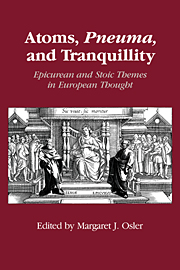Book contents
- Frontmatter
- Contents
- List of contributors
- Acknowledgments
- Introduction
- 1 Ethics and logic in Stoicism
- 2 Medieval connectives, Hellenistic connections: the strange case of propositional logic
- 3 Stoic psychotherapy in the Middle Ages and Renaissance: Petrarch's De remediis
- 4 Alonso de Cartagena and John Calvin as interpreters of Seneca's De clementia
- 5 The Epicurean in Lorenzo Valla's On Pleasure
- 6 Seneca's role in popularizing Epicurus in the sixteenth century
- 7 Stoic contributions to early modern science
- 8 Fortune, fate, and divination: Gassendi's voluntarist theology and the baptism of Epicureanism
- 9 Epicureanism and the creation of a privatist ethic in early seventeenth-century France
- 10 Robert Boyle on Epicurean atheism and atomism
- 11 Stoic and Epicurean doctrines in Newton's system of the world
- 12 Locke, Willis, and the seventeenth-century Epicurean soul
- 13 The Epicurean new way of ideas: Gassendi, Locke, and Berkeley
- 14 The Stoic legacy in the early Scottish Enlightenment
- Index
5 - The Epicurean in Lorenzo Valla's On Pleasure
Published online by Cambridge University Press: 13 November 2009
- Frontmatter
- Contents
- List of contributors
- Acknowledgments
- Introduction
- 1 Ethics and logic in Stoicism
- 2 Medieval connectives, Hellenistic connections: the strange case of propositional logic
- 3 Stoic psychotherapy in the Middle Ages and Renaissance: Petrarch's De remediis
- 4 Alonso de Cartagena and John Calvin as interpreters of Seneca's De clementia
- 5 The Epicurean in Lorenzo Valla's On Pleasure
- 6 Seneca's role in popularizing Epicurus in the sixteenth century
- 7 Stoic contributions to early modern science
- 8 Fortune, fate, and divination: Gassendi's voluntarist theology and the baptism of Epicureanism
- 9 Epicureanism and the creation of a privatist ethic in early seventeenth-century France
- 10 Robert Boyle on Epicurean atheism and atomism
- 11 Stoic and Epicurean doctrines in Newton's system of the world
- 12 Locke, Willis, and the seventeenth-century Epicurean soul
- 13 The Epicurean new way of ideas: Gassendi, Locke, and Berkeley
- 14 The Stoic legacy in the early Scottish Enlightenment
- Index
Summary
A PREMISE
Words (nomina) – some key words in the articulation of Lorenzo Valla's thesis – have a very special meaning in the dialogue On Pleasure. The argument seems to develop on the basis of certain words used with a very particular meaning – words like honestas, honestum, utilitas, utile, fruitio – and to receive impetus from certain verbs, often used in the first person singular: aio atque affirmo, sic statuo, or volo. These words are very difficult to translate. That is why, in trying to present my interpretation of Valla's Epicureanism, I often feel forced to use the Latin terms, together with their English translations. It is as if Valla had invented them.
The key word in the whole argument is voluptas. I define elsewhere (A Defense of Life, Chap. 2) Valla's process as “discovering a new meaning and function in an old word.” In the present essay I try to shed further light on this new meaning by focusing on the character of the Epicurean as the main character of a drama which opposes voluptas to honestas.
SETTING THE PROBLEM: WHAT IS VALLA'S VOLUPTAS?
Lorenzo Valla disseminated his dialogue On Pleasure in its first version, entitled De voluptate, from Piacenza in 1431. He must have conceived it, and probably wrote it down (at least in part) while in his hometown of Rome, where he lived close to the environment of the Curia. In 1430 he moved to Piacenza, called there by his friend Panormita, whom he introduced as the “Epicurean” in his dialogue. Valla was in his middle twenties.
- Type
- Chapter
- Information
- Atoms, Pneuma, and TranquillityEpicurean and Stoic Themes in European Thought, pp. 89 - 114Publisher: Cambridge University PressPrint publication year: 1991
- 3
- Cited by

